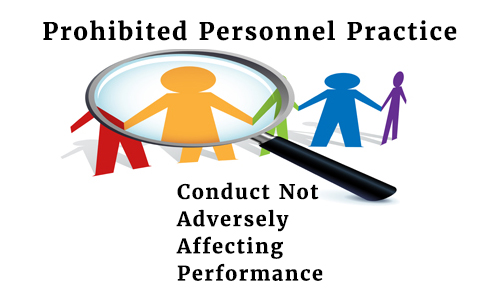Prohibited Personnel Practice 10: Conduct Not Adversely Affecting Performance
Where can I find this provision?
This month's prohibited personnel practice (PPP) is part of the Civil Service Reform Act of 1978 (the Reform Act), Pub. L. No. 95-454, 92 Stat. 1111. Like the other prohibited personnel practices discussed in this series, it is codified at 5 U.S.C. § 2302(b).
What is the purpose of this provision?
This provision supports the second and the eighth Merit System Principles that all employees and applicants for Federal employment should on the merits receive fair and equitable treatment in all aspects of personnel management with proper regard for their privacy and constitutional rights and should be protected against arbitrary action and personal favoritism. 5 U.S.C. §§ 2301(b)(2), 2301(b)(8)(A). The Merit Systems Protection Board (MSPB or Board) examined the legislative history of section 2302(b)(10) in Merritt v. Department of Justice, 6 M.S.P.R. 585 (1981), distinguished by Kruger v. Department of Justice, 32 M.S.P.R. 71 n. 2 (1987). During deliberations, Representative Harris, who moved for the adoption of section 2302(b)(10), explained: “The amendment adds to the prohibited practices this provision which would bar an official from taking action against any employee or applicant for employment as a reprisal for non-job related conduct. I think it is clear to prohibit discrimination against activities that have no bearing on one's job. Psychiatry, outside interests, a member of ‘NOW’ or ‘Taxpayers Alliance’ or what have you.” Merritt, 6 M.S.P.R. at 602. The Board has held that section 2302(b)(10) is designed to prohibit personnel practices that are taken in response to an employee's off-duty conduct or interests that are unrelated to job performance. Thompson v. Farm Credit Administration, 51 M.S.P.R. 569 n. 16 (1991) (citing Garrow v. Gramm, 856 F.2d 203, 207 (D.C. Cir. 1988)).
What must be shown to establish a violation of this provision?
The Board has not established the precise elements for proving a violation of 5 U.S.C. § 2302(b)(10). MacLean v. Department of Homeland Security, 116 M.S.P.R. 562, ¶ 25 (2011), review reinstated by 460 Fed. Appx. 927 (Fed. Cir. 2011). Depending on the specific facts and circumstances, the proscription of section 2302(b)(10) may be analogous to either (1) the prohibition against retaliation for exercising appeal rights, filing grievances, etc., found at 5 U.S.C. § 2302(b)(9), or to (2) a traditional claim of discrimination governed by the principles of Title VII. Id.
In what kinds of situations does this practice typically arise?
Initially, this PPP was addressed by the Board shortly after the Reform Act on the question of whether the agency could rely on a rebuttable presumption of nexus or a connection to the efficiency of the service for certain off-duty or criminal misconduct. See Johnson v. Department of Health & Human Services, 22 M.S.P.R. 521, 524 (1984) (citing to Merritt, 6 M.S.P.R. at 606). More recently, this PPP has been addressed by the Board on the question of whether the agency’s otherwise appealable action constituted discrimination on the basis of sexual orientation, political beliefs, or participation in certain organizations. See Mahaffey v. Department of Agriculture, 105 M.S.P.R. 347, ¶ 23 (2007).
How do I pursue a claim that someone violated this provision?
The OSC receives and investigates claims of prohibited personnel practices, including this provision. 5 U.S.C. § 1214(a)(1)(A). If OSC concludes that there has been a violation, it may request that MSPB take disciplinary action against the violator. Id. § 1215. The Special Counsel also may petition the Board for corrective action on behalf of a person who has been or is about to be subjected to a prohibited personnel practice under section 2302(b)(10). Id. § 1214(b)(2)(C). In both types of proceedings, the case will be heard by an administrative law judge who will make an initial decision that can be appealed to the full Board. 5 C.F.R. §§ 1201.125, 1201.131.
An individual employee also could raise this provision as an affirmative defense to an agency’s adverse personnel action that is within MSPB’s jurisdiction, such as a removal. 5 U.S.C. § 7701(c)(2)(B). Absent an otherwise appealable matter, MSPB (as opposed to OSC) does not have jurisdiction to hear a claim by an individual that this provision has been violated. See Wren v. Department of the Army, 2 M.S.P.R. 1, 2 (1980), aff'd, 681 F.2d 867, 871‑73 (D.C. Cir. 1982).
What penalties may the Board impose for violations of this provision?
In a disciplinary action brought by the Special Counsel, the penalties the Board may impose include reprimanding, suspending, demoting, or removing the offender from Federal employment; prohibiting the offender from working for the Federal Government for up to 5 years; and imposing a fine of up to $1000. 5 U.S.C. § 1215(a)(3).
Are there exceptions to this practice?
Yes. As authorized by the last provision of § 2301(b)(10), under 5 C.F.R. § 731.202, OPM or an agency with delegated authority, may consider criminal or dishonest conduct against an applicant, appointee, or employee in determining suitability.
Has MSPB studied this practice?
Yes. In its report Prohibited Personnel Practices: Employee Perceptions, the Board reported that in 2010, 2.0 percent of respondents perceived that they were personally affected by discrimination in favor or against someone in a personnel action on the basis of off-duty conduct which was entirely unrelated to the job. An additional 5.6 percent reported that they observed such discrimination without being personally affected. Id. at 36. Also, 1.1 percent reported they were personally affected by discrimination based on sexual orientation, while 3.2 percent reported observing the discrimination without being personally affected. Id. at 34.
